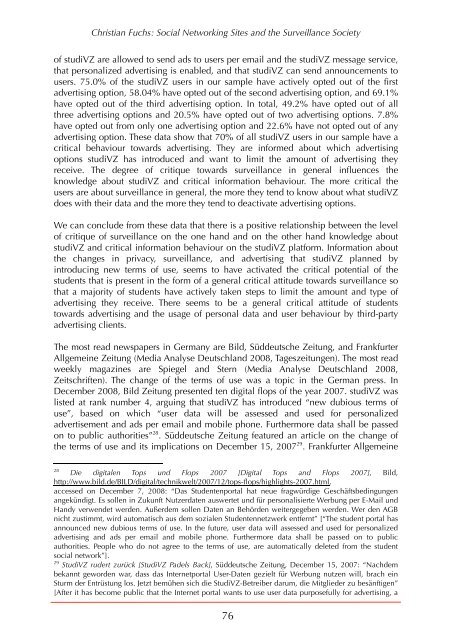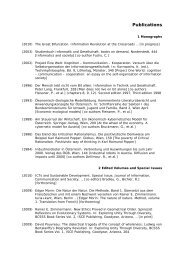CHRISTIAN FUCHS - ICT&S - Universität Salzburg
CHRISTIAN FUCHS - ICT&S - Universität Salzburg
CHRISTIAN FUCHS - ICT&S - Universität Salzburg
Create successful ePaper yourself
Turn your PDF publications into a flip-book with our unique Google optimized e-Paper software.
Christian Fuchs: Social Networking Sites and the Surveillance Societyof studiVZ are allowed to send ads to users per email and the studiVZ message service,that personalized advertising is enabled, and that studiVZ can send announcements tousers. 75.0% of the studiVZ users in our sample have actively opted out of the firstadvertising option, 58.04% have opted out of the second advertising option, and 69.1%have opted out of the third advertising option. In total, 49.2% have opted out of allthree advertising options and 20.5% have opted out of two advertising options. 7.8%have opted out from only one advertising option and 22.6% have not opted out of anyadvertising option. These data show that 70% of all studiVZ users in our sample have acritical behaviour towards advertising. They are informed about which advertisingoptions studiVZ has introduced and want to limit the amount of advertising theyreceive. The degree of critique towards surveillance in general influences theknowledge about studiVZ and critical information behaviour. The more critical theusers are about surveillance in general, the more they tend to know about what studiVZdoes with their data and the more they tend to deactivate advertising options.We can conclude from these data that there is a positive relationship between the levelof critique of surveillance on the one hand and on the other hand knowledge aboutstudiVZ and critical information behaviour on the studiVZ platform. Information aboutthe changes in privacy, surveillance, and advertising that studiVZ planned byintroducing new terms of use, seems to have activated the critical potential of thestudents that is present in the form of a general critical attitude towards surveillance sothat a majority of students have actively taken steps to limit the amount and type ofadvertising they receive. There seems to be a general critical attitude of studentstowards advertising and the usage of personal data and user behaviour by third-partyadvertising clients.The most read newspapers in Germany are Bild, Süddeutsche Zeitung, and FrankfurterAllgemeine Zeitung (Media Analyse Deutschland 2008, Tageszeitungen). The most readweekly magazines are Spiegel and Stern (Media Analyse Deutschland 2008,Zeitschriften). The change of the terms of use was a topic in the German press. InDecember 2008, Bild Zeitung presented ten digital flops of the year 2007. studiVZ waslisted at rank number 4, arguing that studiVZ has introduced “new dubious terms ofuse”, based on which “user data will be assessed and used for personalizedadvertisement and ads per email and mobile phone. Furthermore data shall be passedon to public authorities” 28 . Süddeutsche Zeitung featured an article on the change ofthe terms of use and its implications on December 15, 2007 29 . Frankfurter Allgemeine28Die digitalen Tops und Flops 2007 [Digital Tops and Flops 2007], Bild,http://www.bild.de/BILD/digital/technikwelt/2007/12/tops-flops/highlights-2007.html,accessed on December 7, 2008: “Das Studentenportal hat neue fragwürdige Geschäftsbedingungenangekündigt. Es sollen in Zukunft Nutzerdaten auswertet und für personalisierte Werbung per E-Mail undHandy verwendet werden. Außerdem sollen Daten an Behörden weitergegeben werden. Wer den AGBnicht zustimmt, wird automatisch aus dem sozialen Studentennetzwerk entfernt” [“The student portal hasannounced new dubious terms of use. In the future, user data will assessed and used for personalizedadvertising and ads per email and mobile phone. Furthermore data shall be passed on to publicauthorities. People who do not agree to the terms of use, are automatically deleted from the studentsocial network”].29 StudiVZ rudert zurück [StudiVZ Padels Back], Süddeutsche Zeitung, December 15, 2007: “Nachdembekannt geworden war, dass das Internetportal User-Daten gezielt für Werbung nutzen will, brach einSturm der Entrüstung los. Jetzt bemühen sich die StudiVZ-Betreiber darum, die Mitglieder zu besänftigen”[After it has become public that the Internet portal wants to use user data purposefully for advertising, a76









